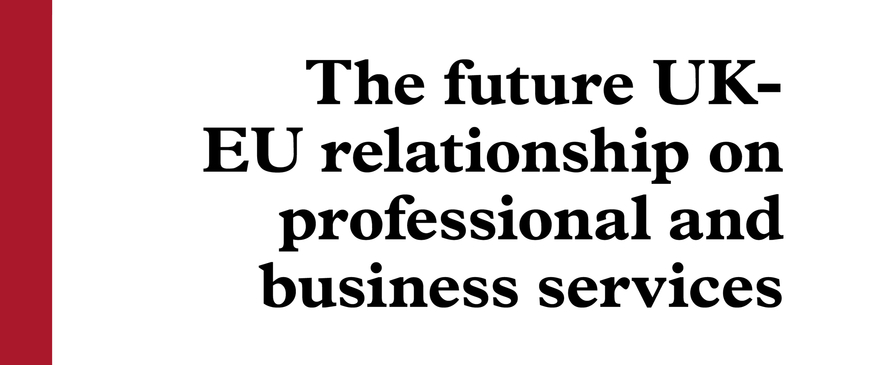
The future UK-EU relationship on professional and business services
Sam Lowe, senior research fellow, Centre for European Reform, emphasised the relationship between these sectors and manufacturing exports, saying that: “ a lot of smaller SMEs do not think they are linked to the broader global market, but they are. A lot of them service local manufacturers, and because they are servicing local manufacturers their value is, I suppose, generated ultimately through a manufacturing export. The value added from services embodied in manufacturing exports is significant “.29
...Sam Lowe noted that FTAs on trade in goods generally addressed tariffs, agreements on trade in services addressed “regulation, very often local regulation and qualifications”, and were therefore “much more convoluted and complex”.39
...Sam Lowe therefore warned that “a good free trade agreement at the end of this year is preferable to not having one, but it is not going to save the services sector. It is not that different from trading without one, except in a few specific areas.”42 The UK Trade Policy Observatory (UKTPO) agreed, stating that the benefits of an FTA for businesses “arise mainly from a reduction in the uncertainty around the market conditions that domestic businesses could face when exporting services”.43
...Sam Lowe identified these as “provisions in a trade agreement that if, in future, the other partner country offers greater access to its market in a trade agreement with another country, we get that too”.44 He said that there was a live question as to whether the ‘Most Favoured Nation’ clauses on services and investment in the EU’s trade deals with Canada, South Korea, Japan, the Caribbean Forum, Vietnam and Mexico would mean that if the EU granted “more ambitious services provisions to the UK, it will automatically also have to offer them to Japan, for example”. He added, though that there were “quite a lot of caveats to the provision”.45
...Sam Lowe agreed that regulated sectors were affected more than nonregulated activities, but qualified this by saying that “as a rule of thumb” the EU “makes cross-border trade” from outside the Single Market “quite difficult”.61
...Sam Lowe told us, for example, that most EU Member States—including Austria, France, Germany and Ireland—”make commercial presence or establishment a condition of access” for third country lawyers.63 Simon Davis warned against any reservations to a future UK-EU agreement that might allow Member States to require the “physical presence of foreign lawyers on a temporary or permanent basis”, as well as “nationality requirements” and “some residency qualifications”.64
...The Commission’s proposal is three years,138which, Sam Lowe described as “the normal EU proposal”.139
...Sam Lowe felt that these industries owe much of their success to the ability to attract “the best and brightest” from Europe and further afield. He believed that relying on professionals who “are able to operate in [other] countries because they know the language and the local context” had been a key driver behind UK exports of professional and business services.142
...In Sam Lowe’s words: “The UK is proposing a framework in which, the moment a UK-registered professional applies for their qualification to be recognised in an EU member state, the default is that that recognition is granted, subject to an aptitude test.”187
...Sam Lowe did not anticipate significant issues in reaching a positive agreement this area as the UK and EU approaches were “broadly aligned”.198
